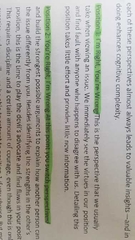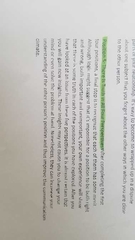![]()
![]()
![]()
Use LEFT and RIGHT arrow keys to navigate between flashcards;
Use UP and DOWN arrow keys to flip the card;
H to show hint;
A reads text to speech;
12 Cards in this Set
- Front
- Back
- 3rd side (hint)
|
The Perception Process |
Selection
- Stereotyping - Punctuation • Interpretation - personal experience - assumptions about human behavior •Organization- Stereotyping - Punctuation• Interpretation- personal experience- assumptions about human behavior- attitudes- expectations- knowledge- self concept- relational satisfaction• Negotiation - attitudes - expectations - assumptions about human behavior- attitudes- expectations- knowledge- self concept- relational satisfaction• Negotiation - knowledge - self concept - relational satisfaction • Negotiation
|
First Part of Chapter |
|
|
Influences on Perception |
• Access to information • Physiological Influences - The Senses - Physiological Challenges - Age - Health and Fatigue - Hunger - Biological Cycle •Cultural Differences • Social Roles - Gender Roles - Occupational Roles - Relational Roles |
|
|
|
Attribution Errors |
• We judge ourselves more charitably than we judge others. • We cling to first impressions. • We assume that others are similar to us. • We are influenced by our expectations. • We are influenced by the obvious. |
|
|
|
Perception Checking: Elements of perception checking |
- A description of the behavior you noticed - At least two possible interpretations of the behavior - A request for clarification about how to interpret the behavior |
|
|
|
Perception checking: perception checking considerations |
Completeness Nonverbal congruency Cultural rules Face Saving |
|
|
|
Empathy, cognitive complexity, and communication: Empathy |
Empathy: empathy is the ability to recreate another person's perspective, to experience the world from the others point of view. |
|
|
|
Empathy, cognitive complexity, and communication: cognitive complexity |
The ability to construct a variety of frameworks for viewing an issue. |
|
|
|
The Pillow Method: Position One |

I'm right, you're wrong:
|
|
|
|
The pillow method: position two |

|
|
|
|
The pillow method: position 3 |

|
|
|
|
The pillow method: position 4 |

|
|
|
|
The pillow method: position 5 |

|
|

